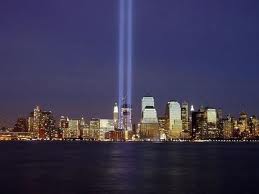Forgiving 911 Times
On this anniversary of 9/11 the papers are full of stories about fisticuffs over the memorial at ground zero. It’s NYC and Bloomberg versus NY and Cuomo, fighting over who gets to control the memorial, who has to pay for it (it costs $60 million a year to maintain).
This is about all the little mind can do with a loss like this—fight about it. I still see the signs, emblazoned over the image of the twin towers. “We Will Not Forget.” We will not forget what was done to us. We will not forget the pain, we will keep fresh the memory of insult, of injury. No one can stop us from drinking a little maintenance dose of bitter poison every day.
This is the way to burn an eight-inch hole in the belly of your soul.
Unforgiveness is self-destruction. Yet we can hardly be talked out of it. I shall take my revenge on you by killing myself. Slowly.
Could this be why almost two-thirds of Jesus’ words are in some way about forgiveness?
Forgiving our enemies may be the hardest thing a human being can do. But it’s all I want to think about today. In her book The Hiding Place, Corrie ten Boom tells of being zapped—literally—with the grace of forgiveness.
She was speaking at a church in Munich, and as people were leaving, suddenly a man was standing before her, the Nazi SS agent who guarded the shower floor where she and so many women were subjected to indignities and cruelties. He reached out his hand and asked for forgiveness, the man who perched above the mass shower room and watched as naked, frightened women were sprayed with cold water. This was the man she hated more than any of them. His arm was extended, but her arm was paralyzed. She breathed a silent prayer, “Jesus, I cannot forgive him. Give me your forgiveness.” She stood in quiet rage until finally her arm began to move. She writes, “As I took his hand, the most incredible thing happened. From my shoulder along my arm and through my hand, a current seemed to pass from me to him, while into my heart sprang a love for this stranger that overwhelmed me. And so I discovered that it’s not our own forgiveness that the world’s healing hinges on, but on his. When he tells us to love our enemies, he gives, along with the command, the love itself.”
The world system knows nothing of this love, nothing of this forgiveness. It mocks enemy-love as pathetic weakness, despite the fact, that, as Mahatma Gandhi said, “The weak can never forgive. Forgiveness is the attribute of the strong.”
Spend a moment on 9/11 praying for the love, the forgiveness that comes not from your own small store, but from the endless sea of divine mercy.

Amen, David!
(I love Corrie ten Boom.) The sentence, “When he tells us to love our enemies, he gives, along with the command, the love itself.” – is powerful, yet gentle. I also liked, “…praying for the love, the forgiveness that comes not from your own small store, but from the endless sea of divine mercy.” Endless sea of divine mercy sounds like the definite choice. Thanks for sharing.
Thank you for this message, David. Peace and Harmony to you and all, Sally
I have always been bothered by the desire to “never forget.” Thanks for showing us another way…
Thank you, David. Reading this to our group of volunteers today. It’s not our love, but His.